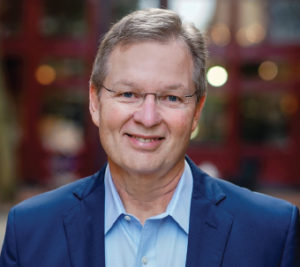CEO, Stonerise

By Ken Magill
Though he started his career as an accountant, Stonerise CEO Larry Pack sees patients as far more than just entries on a spreadsheet. They are individuals with their own unique needs who should be given health care with love, respect and a mission of getting them back to their lives.
Pack co-founded Stonerise in 2009 and has since overseen its growth from three facilities with 350 employees to 17 care centers serving all of West Virginia and three counties in southeast Ohio. Today, Stonerise employs more than 3,000 team members who provide a broad range of care services to more than 2,000 patients in West Virginia and southeast Ohio, including transitional and skilled nursing care, therapy, home health care and hospice.
“We were founded in 2009 because we wanted to play a more complete, responsible and loving role in a person’s health journey,” says Pack. “We saw health care becoming more fragmented, with patients sometimes left to manage ongoing conditions and care transitions on their own. We saw an opportunity to apply our expertise with care and love.”
Stonerise’s stated mission is to get patients back to health and back to life, which is an unusual mission statement for nursing homes. Shortly after Stonerise’s founding, it became apparent that growth was necessary to fulfill that mission. The organization’s health care model would have to expand outside its nursing centers and into other parts of people’s health care journey, like their homes.
“Our idea of complete care throughout an entire health journey required a new model of transitional care that would see patients through each step of their health journeys, wherever that leads,” says Pack.
Ordinarily, a nursing home is considered the last stop in a patient’s health care journey, but Stonerise’s facilities are called transitional care centers. Along with traditional, long-term stays, Stonerise offers short-term stays for patients until they are healthy enough to go home.
Stonerise also helps patients transition from one care provider or level of care to another.
For example, a severely overweight, diabetic patient with a mild case of dementia will require vastly different treatments and resources than a patient with heart issues who has had a stroke. Stonerise’s aim, however, is the same in both cases—coordinate the appropriate set of treatments and resources to get both patients well enough to go home and get back to their lives.
“Often when people think about nursing homes, they aren’t thinking about the critical link we play in the health care continuum,” says Pack. “The hospitals rely on us to accept patients who are too sick to go home just yet. Those patients and families rely on us as well.”
Pack also places emphasis on home health care wherever possible. “Home health is imperative because it’s the future,” says Pack. “People want to get care where they are most comfortable—in their homes.”
Pack began his career as a certified public accountant (CPA), making partner at the Charleston firm Herman & Cormany in his mid-20s. His experience as a CPA, along with a family full of small-business entrepreneurs, gave him the foundational knowledge he would need to steer Stonerise toward success.
“When you’re a local CPA, you represent many different businesses,” he says. “I was able to observe good and bad leaders. I got a crash course in business administration by working with fantastic Southern West Virginia businesses.”
Pack is a member of the House of Delegates in the West Virginia Legislature. Additionally, he has served as a member of the Republican National Committee for four years.
Pack has been involved in the West Virginia Health Care Association for more than 20 years and is its current secretary. He has also served on the boards of the Charleston Coliseum & Convention Center, West Virginia Health Right and the West Virginia
Chapter of the Alzheimer’s Association.
Pack says two people were critical in mentoring him: the late Kanawha County business leader, Calvin Sutphin, and West Virginia Department of Health Secretary, Bill Crouch.
Sutphin taught Pack team building and how to create an atmosphere of encouragement. Crouch taught him business structure and attention to detail.
Pack’s family and his relationship with the Lord have played an instrumental role in his success. He feels very blessed for these influences.
Stonerise Innovations
COVID-19 has changed how Stonerise delivers its services but not the services themselves, according to CEO Larry Pack.
“Caring for our patients with love has never stopped being our top priority, and that includes keeping them, along with our team members, safe,” he says.
To help patients and staff cope with the social distancing challenges of COVID-19, Stonerise implemented televisit technology and online scheduling at its care centers with Stonerise iPads for patients to stay connected to their loved ones.
Stonerise also created a guardian angel program where one team member checks in regularly with families and keeps them informed of any changes at the center or with their loved one.
Stonerise also launched a daily updated online dashboard with testing results and visitation status for all its centers.
Early in the pandemic, Stonerise management decided to invest monetarily, emotionally and spiritually in the frontline employees who would be critical in helping the organization navigate through such uncertainty.
“We made our team members a priority by ensuring they had necessary supplies, offering pay increases and offering Chaplain support with daily devotionals and prayer requests,” says Pack.
Going forward, Stonerise’s unique transitional care model will remain a focal point for further development, according to Pack.
“We want care transitions—whether it is after a hospital stay or coordinating with multiple specialty physicians—to be less uncertain, more human and more loving,” says Pack. “We aspire to continue reinventing how we care for one another as we age.”








